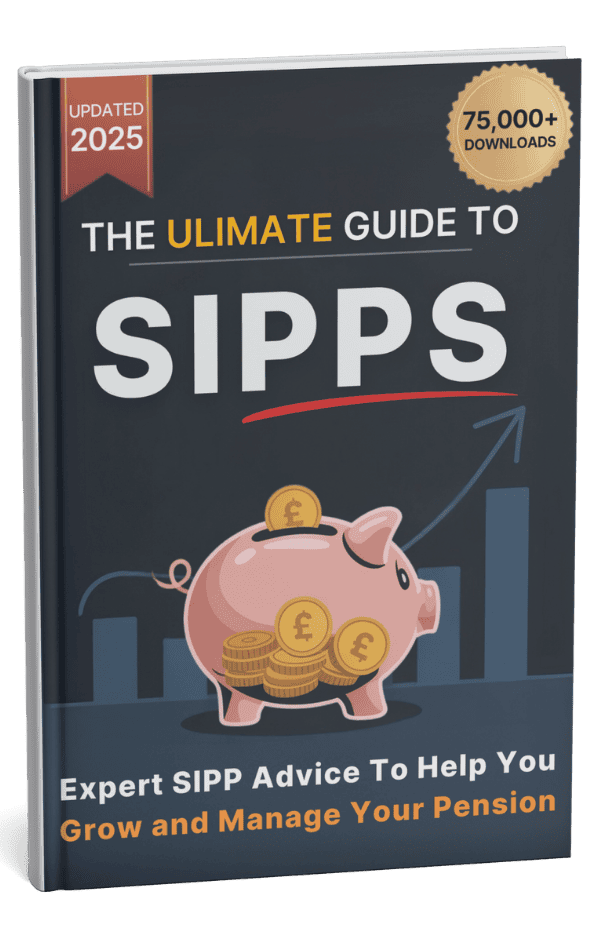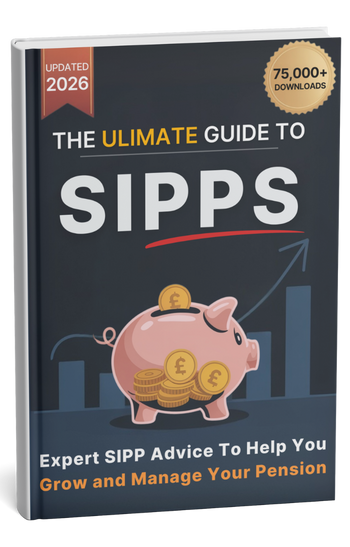
Which SIPPs Work Best for the Self-Employed?
See How Much Your Future Pension Income Could Be In Just 60 Seconds — No Fees, No Obligation.
How Much Could You Unlock?
Why Homeowners Trust Us
Try Our Free Pension Calculator
Quick, Safe Estimate

No Commitments
Key Takeaways
- Vanguard and Hargreaves Lansdown are considered top firms for SIPP accounts, providing enhanced flexibility and control over investment choices, with fees varying by provider and the types of investments selected.
- To open a SIPP, select a provider, complete their application process, and be armed with the knowledge that you can contribute up to £40,000 per year.
- Unlike traditional pensions, SIPPs allow you to select your own investments, giving you greater control over your retirement funds.
In the rapidly evolving financial landscape, securing the best SIPP account could be more crucial than ever for prudent retirement planning.
As of 2023, the SIPP market is worth an impressive £50 billion and shows no signs of slowing down,1 highlighting its significance as a retirement savings option for investors in the UK.
If you are considering a SIPP, the importance of choosing the right account cannot be overstated, as factors like fees, investment options, and flexibility can greatly affect your long-term returns.
In This Article, You Will Discover:
EveryInvestor has leveraged its extensive resources to conduct in-depth research to provide readers with the most current and comprehensive information available on the best SIPP account for you.
Our content undergoes strict quality and compliance checks before publication so we can be sure of bringing you only the most up-to-date and relevant information.
What is the best SIPP account for retirees over 65?
For retirees over 65, the best SIPP account should offer flexible investment options to suit their changing needs, low fees to maximize returns in retirement, and easy access to expert advice for managing their portfolio effectively.
Additionally, the account should provide a range of retirement income options, such as annuities or drawdown, to ensure retirees can make informed decisions based on their individual circumstances.
Retirees over 65 may benefit from SIPP accounts that offer estate planning services, tax-efficient investment strategies, and the ability to consolidate multiple pensions into one convenient account.
This can help retirees simplify their financial affairs and ensure their retirement savings are managed efficiently throughout their golden years.
What Is a SIPP Account?
A SIPP account is a type of personal pension scheme available in the United Kingdom that offers individuals greater control over their retirement investments.
Known as a Self-Invested Personal Pension, a SIPP differs from traditional pension plans by allowing investors to self-manage their portfolio, choosing from a wide array of assets including stocks, bonds, and sometimes property.
The age for accessing funds in a SIPP is the same as the UK's normal minimum pension age, currently set at 55 but due to increase to 57 from 2028.2
Important
The responsibility for investment decisions and the associated risks rests with the individual, making it crucial to have a good understanding of investment strategies or to seek financial advice.
Remember, however, that even professional advice has its limitations and cannot guarantee investment success.
How Do SIPP Accounts Work?
SIPP accounts work by providing clients with a flexible way to save for retirement, where they have the autonomy to make their own investment decisions.
In a SIPP, the account holder can choose from a wide range of investment options, including stocks, bonds, funds, and, in some cases, property.3
Did you know?
The key feature of SIPPs is the control they offer over how retirement funds are invested.
What about tax relief?
Contributions made into a SIPP are eligible for tax relief at the account holder's highest rate of income tax.
How this works:
- For every £80 a basic rate taxpayer contributes, the government adds £20, effectively boosting the contribution to £100.
- For higher and additional rate taxpayers, further tax relief can be claimed through their tax returns.
Other tax incentives include:
- The funds within a SIPP can grow free from Income and Capital Gains tax
- Account holders can typically start withdrawing funds from the age of 55 (or 57 from 2028).4 Upon retirement, the account holder can choose to withdraw a 25% tax-free lump sum from their SIPP, with the remaining funds taxed at their marginal rate when withdrawn.
Important
While SIPPs offer more investment choices, they also carry more risk as the investment decisions are solely the responsibility of the account holder.
Additionally, SIPPs may come with various fees and charges, which can vary between providers.
Because of the complexity and risks associated with managing a SIPP, it is often advisable to seek financial advice, especially for those who are not experienced in making investment decisions.
What Are the Benefits of a SIPP Account?
The benefits of a SIPP account are manifold, particularly for those seeking a flexible and potentially tax-efficient way to save for retirement.
These benefits include:
- The availability of a broad range of investment choices, which allows account holders to invest in a variety of assets such as stocks, bonds, funds—and even property in some cases. This flexibility enables investors to tailor their portfolios to their specific investment goals and risk tolerance.
- Tax relief on contributions at the account holder's highest rate of income tax. For example, for every £80 contributed by a basic rate taxpayer, the government adds £20, boosting the total contribution to £100. Higher and additional rate taxpayers can claim even more tax relief through their tax returns.
- Control and flexibility in terms of both contributions and withdrawals, as account holders can decide how much and when to contribute. Also, upon reaching retirement age (currently 55 but rising to 57 in 2028),5 investors have various options for accessing their funds, including taking a 25% tax-free lump sum.
- Tax-free growth on the funds within a SIPP, which can potentially lead to significant tax savings, especially over a long-term investment horizon. The compounding effect of these tax-efficient returns can substantially increase the size of the retirement pot.
Always keep in mind
With greater control comes greater responsibility and risk, as the success of a SIPP depends on the investment choices made by the individual, and the value of investments can go down as well as up.
Additionally, SIPPs can have various charges and fees, so it's crucial to understand these and shop around for a competitive provider.
What Are the Drawbacks to a SIPP Account?
The drawbacks to a SIPP account are primarily related to the complexity and risks associated with self-managing a pension.
Potential drawbacks include:
- The requirement for the account holder to make their own investment decisions, as this necessitates a good understanding of investment strategies and the financial markets, which can be daunting for those without experience.
- The fee structure associated with SIPPs. SIPPs often come with various charges, including set-up fees, annual management fees, and transaction fees. These costs can vary widely between providers and can erode investment returns over time, particularly if the fees are high relative to the investment amount.
- The pronounced risk factor as compared to that of traditional pension schemes. Since the value of investments can fluctuate, there is a possibility of getting back less than what was invested, especially if the chosen investments do not perform well. This risk requires ongoing monitoring and potential rebalancing of the portfolio, which can be time-consuming and require a certain level of expertise.
- The flexibility that SIPPs offer, as this feature can be something of a double-edged sword. While having control over contributions and withdrawals offers clear advantages, it also means that individuals must be disciplined in their saving and investment strategies to ensure that their pension pot is sufficient for their retirement needs.
- Inaccessibility of funds in a SIPP, as these cannot be touched until the age of 55 (or 57 from 2028). This means that funds invested in a SIPP are essentially locked away until retirement age, which might not be suitable for those who may need access to their funds earlier.
In short
While SIPPs offer a high degree of flexibility and potential tax advantages, they require active management, incur various fees, and carry a higher level of investment risk.
Therefore, they might not be suitable for everyone, particularly for those who prefer a more hands-off approach or are not confident in their investment skills.
Seek professional financial or pensions advice to understand the implications and suitability of this pension scheme.
What Are the Best SIPP Accounts?
The best SIPP accounts are those that meet the individual’s needs with a balanced mix of low fees, diverse investment options, and a user-friendly platform
AJ Bell: Best All-Rounder
AJ Bell is often recognised for its well-rounded product offering and competitive pricing, particularly among providers that charge based on portfolio value, and its wide range of investment options, which you can trade online or via the app.
Freetrade: Best Low-Cost Platform
Freetrade offers a low-cost, commission-free SIPP that may be especially advantageous for higher-value portfolios.
Its user-friendly app, coupled with the absence of withdrawal fees, makes it an attractive choice for both young and experienced investors.
What Are Other SIPP Accounts Worth Considering?
Bestinvest
Bestinvest combines affordable digital investment and stock trading options with tailored professional guidance, making it a fitting choice for long-term investors interested in pre-constructed portfolios and financial mentorship.
Vanguard
Vanguard offers the lowest-cost SIPP option for those focused on affordability, but its investment scope is limited to a range of up to 75 Vanguard funds, excluding individual stocks and shares.
Therefore, it may not be the best fit for those seeking a broader investment portfolio.
Hargreaves Lansdown
Hargreaves Lansdown appeals to those seeking a premium service, offering an extensive range of both domestic and international investment options, along with robust research tools and excellent customer service.
Its standout feature is the access it provides to a vast selection of investments, including over 3,000 funds and various bonds.
How Do You Select the Best SIPP Account for You?
To select the best SIPP account for you, consider the investment options, fees and charges, platform features and usability, and customer service and support.
Research Investment Options
Researching investment options should include the range and diversity of available investment assets—such as equities, bonds, mutual funds, and other alternative options—to evaluate the flexibility each SIPP provider offers to investors.
Compare Fees & Charges
When comparing fees and charges, take into account management fees and trading costs, to determine how each SIPP provider stacks up in terms of affordability and value for money.
Investigate Platform Features & Usability
Investigate platform features and usability by looking at its user interface, ease of navigation, and the availability of tools and resources to gauge how user-friendly each platform is for investors of varying levels of expertise.
Research Customer Service & Support
Research customer service and support by reading reviews on independent platforms such as Trustpilot and Reviews.io.
Remember, however, that online reviews may not necessarily paint the full picture when it comes to customer service quality.
Compare Flexibility & Control
Consider transfer options, withdrawal rules, and asset choices within different SIPP accounts.
Common Questions
A SIPP account offers tax advantages, flexibility in investment choices, and the potential for higher returns compared to a traditional pension.
You have control over where your money is invested, allowing you to tailor your portfolio to suit your financial goals and risk tolerance.
To open a SIPP account, you can either contact a financial advisor or set one up through a reputable provider.
You will need to provide personal details, choose your investment options, and decide on your contribution amount.
Make sure to review the provider’s terms and conditions before finalizing the account.
Fees associated with a SIPP account can include administration charges, fund management fees, and trading costs.
These fees can vary depending on the provider and investment options you choose.
It’s essential to understand the fee structure before opening a SIPP account to ensure it aligns with your investment strategy and financial goals.
The maximum contribution limit for a SIPP account is based on your annual income and age, with the current limit set at £40,000 per tax year.
However, you may be able to carry forward any unused allowance from the previous three tax years, potentially increasing your contribution limit.
Keep in mind that there are lifetime limits to consider as well.
A SIPP account differs from a traditional pension in that it offers more investment flexibility and control.
With a SIPP, you can choose from a wide range of investment options, including stocks, bonds, and commercial property.
Additionally, SIPPs are typically more suitable for experienced investors who are comfortable making their investment decisions.
No, the best SIPP account depends on individual needs and investment strategies.
The ‘best’ SIPP provider in the UK in 2026 varies depending on individual investment goals, fees, available asset classes, and user experience, among other factors.
Who the cheapest SIPP provider is will be contingent on a variety of factors such as trading frequency, portfolio size, and the types of assets you intend to invest in.
Choosing a SIPP provider involves evaluating factors like fees, investment options, platform usability, and customer service to find a match for your individual investment goals and preferences.
Common mistakes to avoid when choosing a SIPP include neglecting to compare fees, overlooking investment options, disregarding platform usability, and failing to consider customer service quality.
Consulting a financial advisor before opening a SIPP is generally advisable to ensure you are making well-informed decisions, and key questions to ask could include those related to fees, investment strategy, and how a SIPP may fit into your overall financial plan.
In Conclusion
In the quest to find which SIPP is best for you, remember to ensure that the features and fees of a particular account align with your specific investment goals.
Determining your investment objectives and understanding how they are compatible with different SIPP providers can greatly influence your decision.
For a tailored approach, consulting a qualified financial advisor can provide valuable insights into how a SIPP fits into your broader financial strategy.
By considering all these factors, you may be better positioned to choose the best SIPP account for serving your retirement planning needs optimally.







 100% private. No pressure. Just friendly guidance.
100% private. No pressure. Just friendly guidance.

